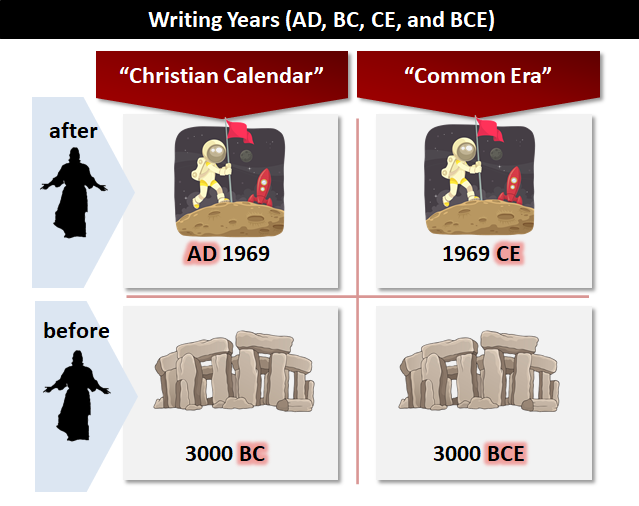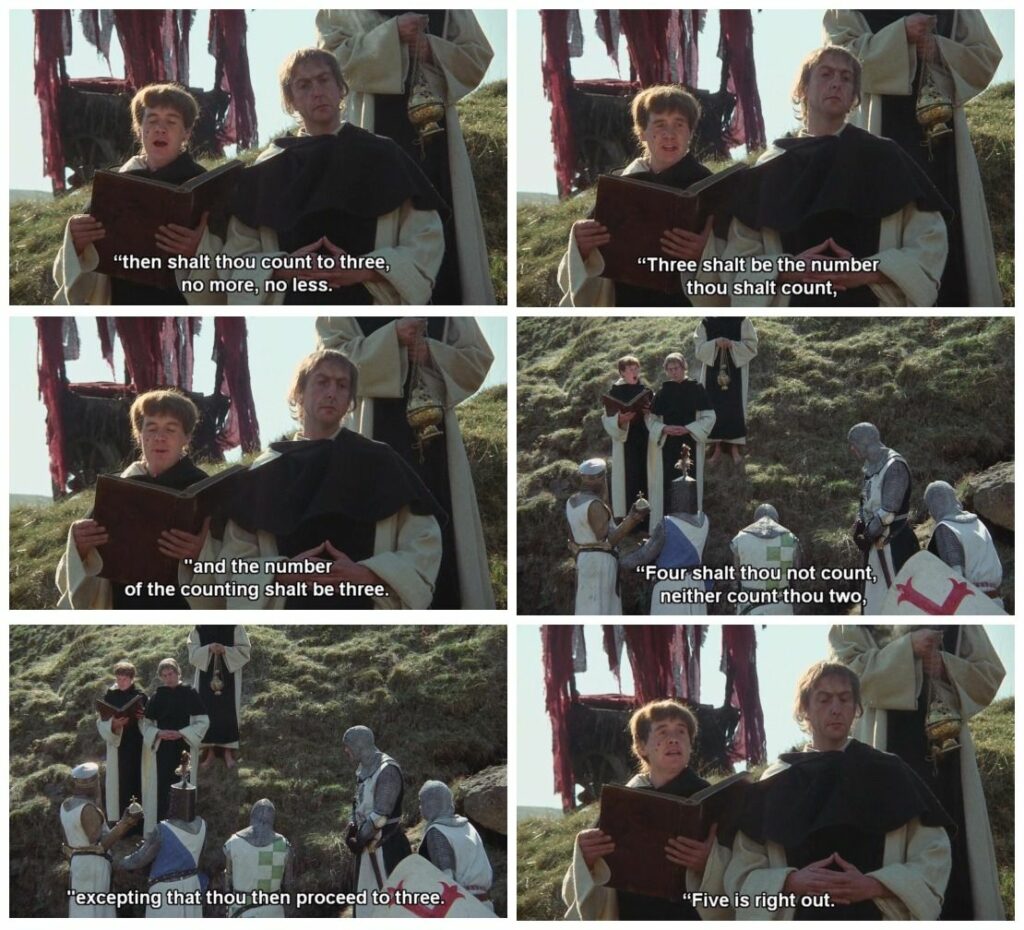
The following is a version of the “Myth of the BC/AD Dating System.” Like all myths, what matters is not what is strictly true, but how the story helps us think about and understand life. The names of the various monks are all actual Catholic saint names, chosen for how funny the author thinks they sound, rather than any concern for historical accuracy.
[SETTING: an early Christian monastery]
BROTHER WALAFRID STRABO: What’s up? You look distressed.
BROTHER DOGFAN: The Abbot put me in charge of writing down whenever our monastery gets pillaged by Vikings.
WALAFRID STRABO: I see. That is going to be a lot of work. We get sacked all the time. Happened just last Thursday.
DOGFAN: Exactly! And to make matters worse, it’s already getting confusing. I just wrote down “got sacked January 15,” but then I realized, how will anyone know which “January 15”? There’s a new one every year.
WALAFRID STRABO: Hm, I see what you mean. We need to be able to distinguish between repeating dates. Like how we say “January 15” and “February 15” to distinguish the 15th day of which month.
DOGFAN: I don’t think we can just keep on making up new month names. That would get to be all sorts of confusing.
WALAFRID STRABO: No, I think what we need is a way to name the years. Better yet, number the years. Like, every new year gets a new number.
DOGFAN: Awesome! But, how do we start? Like, is this year now “Year 1”?
WALAFRID STRABO: No, that would be pretty random. What we need is a fixed point in time to measure from. Something that everyone would recognize…I know! Let’s use the Birth of Jesus! That’s THE most important event ever! We can use it to calculate when other events happened, based on how many years separate them from Jesus’ birth.
DOGFAN: Explain.
WALAFRID STRABO: Well, I happen to know that Jesus was born 1234 years ago. So you could say “we got sacked on January 15, 1234 years away from the Birth of Jesus.” Then everyone could understand exactly when that was!
DOGFAN: That is a wicked cool idea. I love it. More importantly, the Pope will love it.
WALAFRID STRABO: I’m getting into Heaven for sure for this one.
DOGFAN: But wait…we’re early monks, so we have to write everything down by hand. “Years away from the Birth of Jesus” is a lot to write hundreds of times in a book. Can we make it shorter?
WALAFRID STRABO: Sure. We’ll call it…“In the Year of Our Lord.” That way everyone knows Jesus owns time itself, because every year that comes after His birth is His. Such-and-such-happened “In the Year of Our Lord 1234.”
DOGFAN: I see. “In the Year of Our Lord 1234” is the 1234th year in the time of Jesus. Just like “January 15” is the 15th day in January. But “In the Year of Our Lord” still isn’t any shorter.
WALAFRID STRABO: It is if you use Latin! In Latin you can translate that phrase as anno domini. So, “in the anno domini 1234.”
DOGFAN: Ugh, Latin. Now it’s hard to remember and still too long.
WALAFRID STRABO: Fine, we’ll abbreviate the Latin. So, “in the AD 1234.”
DOGFAN: Drop the “the.” Just “in AD 1234.” It’s cleaner.
WALAFRID STRABO: Ugh, FINE. “The Vikings burnt our monastery down in AD 1234.” Happy?
DOGFAN: Very.

BROTHER FRIDUGISUS: What are you guys up to?
WALAFRID STRABO: I’ve invented a system for saying when something happened! All you do is say how many years separate an event from the Birth of Jesus!
FRIDUGISUS: The Most Important Event Ever?
WALAFRID STRABO: Exactly!
FRIDUGISUS: Wow, this couldn’t have come at a better time for me. The Pope has ordered me to calculate how old the Earth is. I think it’s pretty old, decades at least. But the only way I can figure this out is to use those really boring passages in the Bible where they say “Abraham was the father of Isaac, who was the father of Jacob, who was the father of…” If I start with Jesus and count backwards, I can say “Joseph was born 25 years before Jesus, and Heli was born 25 years before Joseph, and Matthat was born 25 years before Heli…” and add it all up.
DOGFAN: That sounds really inaccurate to just assume everyone was 25 years old when they had their most important kid.
FRIDUGISUS: Do you have a better idea?
DOGFAN: No.
WALAFRID STRABO: So when you get your total number, you can say the Earth was formed that many years “from the Birth of Jesus.” Only we’re calling it AD, for anno domini. It’s cleaner.
FRIDUGISUS: Rock on! I’ll totally give you credit for that. The Pope is going to love it.
DOGFAN: Wait a tic. So what you’re saying is, the farther away from the Birth of Jesus, the bigger the numbers? Always?
WALAFRID STRABO: Exactly. That way everyone knows we think Jesus is the Center of All Existence. Which, as early monks, is our main goal in everything.
DOGFAN: But won’t that make duplicate dates again? Like, something that happened 1234 years before the Birth of Jesus and something that happened 1234 years after the Birth of Jesus are both 1234 years from the Birth of Jesus. How can we tell the difference?
FRIDUGISUS: Can’t we just write out which one we mean?
DOGFAN: Do you want to write all that out by hand for all your generations?
FRIDUGISUS: No.
WALAFRID STRABO: What if we use a different phrase? We’ll only use AD if we are talking about something that happened after Jesus was born.
DOGFAN: But anno domini just means “In the Year of the Lord.” And come to think of it, from a theological perspective all years are the years of the Lord. Because Jesus is the same as God the Father, and God the Father is omnipresent, and this idea is so important we should definitely have some schisms and wars about it eventually. “In the Year of the Lord.” You really wrote yourself into a corner with that one.
FRIDUGISUS: Yeah, it would have been better if you had referenced Jesus specifically.
WALAFRID STRABO: Fine. We’ll say “Before Jesus” for years that came before Jesus.
DOGFAN: But to say that in Latin we would have to use ante iesus, which is just kind of gibberish, because Jesus is a Hebrew name so it doesn’t work well in Latin. AND we’re early monks so sometimes we write Js as Js and sometimes as Is which would look like 1s…
WALAFRID STRABO: FINE. We’ll say “Before Christ.”
DOGFAN: But in Latin that’s still ante christem, which is AC, and the stupider monks are going to mix up AC and AD for sure…
WALAFRID STRABO: Ugh, who died and made you King of the Scriptorium? We’ll just use the English “Before Christ.” BC and AD. That’s it. What’s important is, the bigger the number, the farther away from Jesus.
FRIDUGISUS: So, if Joseph was born 25 years before his son Jesus, Joseph was born “in 25 BC”? And if Joseph’s father Heli was born 25 years before that, then Heli was born “in 50 BC”? And Matthat was born 25 years before that, “in 75 BC”? Aren’t those numbers getting bigger even though they’re getting earlier in time?
WALAFRID STRABO: The bigger the number, the farther away from Jesus.
FRIDUGISUS: I feel like maybe this mixture of English and vague Latin, with numbers growing in both directions, could be confusing.
WALAFRID STRABO: Nobody asked you. This is why you ended up as a monk.

Many years later…
PROFESSOR SANCTIMONIOUS: This focus on Jesus is outdated and Christian-centric. We need to move away from it.
PROFESSOR PEDANTIC: It’s a little late to change the entire European chronological system.
SANCTIMONIOUS: Agreed. But we can just change the abbreviations. Let’s stop using Before Christ and Anno Domini and use something else.
PEDANTIC: I mean, that’s fine and all, but if you ignore the birth of Jesus Christ, then the whole system is centered on some random date in the middle of the Roman Empire.
SANCTIMONIOUS: How about we refer to that system as “the Common Era”? So, everything that happened after the supposed Birth of Christ will have happened “in the Common Era,” or CE, and anything that happened before that point will have happened “Before the Common Era,” or BCE. We’ll replace BC with BCE and AD with CE.
PEDANTIC: I feel like that will be super confusing, and that switching “Christ” with “Common” doesn’t really do much to overturn the Eurocentric vocabulary.
SANCTIMONIOUS: Nobody asked you. This is why you ended up as a scholar.